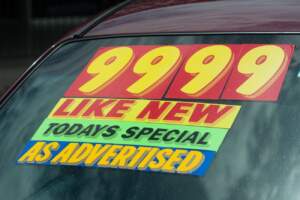So, you’re out looking for a car. A used car seems like the best investment to you, and you think you’ve settled on one that you like. But before you make the purchase, there’s still one thing you want to do, and that’s ordering a car history report.
A car history report will tell you a lot about the vehicle’s past, its condition, any accidents and any other surprises you should know about before closing a deal. You can get a car history report from a large number of places, but you will need to know the car’s VIN for all of them.
So, why exactly is it worth the trouble?
May Have Been in an Accident
If the used car that you’re looking at is more than a year old or has already had more than one owner, then chances are that it’s been in at least one accident in the past. Past accidents can have an effect on the car’s condition, how fast wear and tear sets in, and overall durability of the frame. Depending on the severity of the accident, it could also mean that a number of parts were replaced.
As detailed by the DMV, a car history report will tell you about any past accidents that the vehicle was involved in, as well as whether or not the airbags have been deployed or the vehicle has suffered flood damage. This information can give you a lot of insight into the current quality of the vehicle, any strain on its parts or any past accidents that may affect how it runs.
May Have a Lien on it
Liens are generally something that you won’t want to deal with. When a car has a lien on it, then that means an organization or individual could press a claim on it. This is usually due to debts owed by a previous or current owner of the vehicle. If you purchase a vehicle that has liens on it without making sure those liens are settled first, then it could cause several legal issues or even the car’s repossession.
A car history report will usually tell you about any current liens on a vehicle and will likely give you insight into what you need to do in order to settle them. Unknowingly purchasing a vehicle with a lien on it can be catastrophic, but if you go into the purchase already prepared, then it doesn’t have to be a deal breaker.
May Have a Factory Recall
Occasionally, a car may be released to the public with a faulty or otherwise dangerous component. When this happens, a factory recall usually follows soon after. If a component of your vehicle was faulty when it was manufactured, and it hasn’t been replaced yet, then you’ll likely want to know about it.
A car history report will tell you about any active or past recalls on a vehicle’s components. If there’s currently a recall on your specific model, then you may be able to send it back to the factory or a dealership for free part replacement. However, even if that offer is no longer available, it can still be worth paying for a new part in order to replace a recalled one. If you do end up having to pay for a recalled part, then you’ll want to factor that into the purchasing price of the vehicle.
May Have the Wrong Number of Miles Compared to Odometer
On occasion, a vehicle’s owner could turn back or replace the odometer. The odometer for a specific car may also simply be faulty and display the wrong number of miles. Generally, when you’re buying a car, you expect the seller to be honest about how many miles it’s put on. But you can’t always trust the seller’s word, and the seller may not always know if the number of miles is actually accurate.
A car history report will tell you about a faulty odometer and alert you of any rollbacks. Whether an owner has rolled back the odometer illegally, or it’s simply a faulty odometer from the manufacturer, you want to know about it because the number of miles on a vehicle will have a direct impact on price and longevity.
Conclusion
If you’re buying a used car, even from a well-reputed dealership, it’s important to get a car history report. You’ll be able to tell if there have been any past accidents or damages; any factory recalls on parts of the vehicle; whether or not the odometer is accurate; and any liens that may be on the car. But there are also several other informative pieces of information on the report, which you can find detailed on the DMV’s vehicle history reports page. We encourage you to conduct further research and learn everything you can about vehicle history reports before purchasing a used car.
Overall, there’s really no reason why you shouldn’t get a full car history report before investing thousands of dollars into a used car.

Indy photography / Shutterstock



